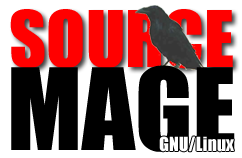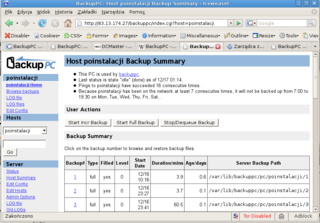
GNU Hurd is a collection of microkernel servers written as part of GNU, for the GNU Mach microkernel. It has been under development since 1990 by the GNU Project of the Free Software Foundation, designed as a replacement for the Unix kernel, and released as free software under the GNU General Public License. When the Linux kernel proved to be a viable solution, development of GNU Hurd slowed, at times alternating between stasis and renewed activity and interest.
The Secure Shell Protocol (SSH) is a cryptographic network protocol for operating network services securely over an unsecured network. Its most notable applications are remote login and command-line execution.
The File Transfer Protocol (FTP) is a standard communication protocol used for the transfer of computer files from a server to a client on a computer network. FTP is built on a client–server model architecture using separate control and data connections between the client and the server. FTP users may authenticate themselves with a plain-text sign-in protocol, normally in the form of a username and password, but can connect anonymously if the server is configured to allow it. For secure transmission that protects the username and password, and encrypts the content, FTP is often secured with SSL/TLS (FTPS) or replaced with SSH File Transfer Protocol (SFTP).

Source Mage is a Linux distribution. As a package is being installed, its source code is automatically downloaded, compiled, and installed. Source Mage is descended from Sorcerer.
Unix security refers to the means of securing a Unix or Unix-like operating system. A secure environment is achieved not only by the design concepts of these operating systems, but also through vigilant user and administrative practices.

Damn Small Linux (DSL) is a discontinued computer operating system for the x86 family of personal computers. It is free and open-source software under the terms of the GNU GPL and other free and open source licenses. It was designed to run graphical user interface applications on older PC hardware, for example, machines with 486 and early Pentium microprocessors and very little random-access memory (RAM). DSL is a Live CD with a size of 50 megabytes (MB). What originally began as an experiment to see how much software could fit in 50 MB eventually became a full Linux distribution. It can be installed on storage media with small capacities, like bootable business cards, USB flash drives, various memory cards, and Zip drives.
In computing, the SSH File Transfer Protocol is a network protocol that provides file access, file transfer, and file management over any reliable data stream. It was designed by the Internet Engineering Task Force (IETF) as an extension of the Secure Shell protocol (SSH) version 2.0 to provide secure file transfer capabilities, and is seen as a replacement of File Transfer Protocol (FTP) due to superior security. The IETF Internet Draft states that, even though this protocol is described in the context of the SSH-2 protocol, it could be used in a number of different applications, such as secure file transfer over Transport Layer Security (TLS) and transfer of management information in VPN applications.
Secure copy protocol (SCP) is a means of securely transferring computer files between a local host and a remote host or between two remote hosts. It is based on the Secure Shell (SSH) protocol. "SCP" commonly refers to both the Secure Copy Protocol and the program itself.

GnuTLS is a free software implementation of the TLS, SSL and DTLS protocols. It offers an application programming interface (API) for applications to enable secure communication over the network transport layer, as well as interfaces to access X.509, PKCS #12, OpenPGP and other structures.

FileZilla is a free and open-source, cross-platform FTP application, consisting of FileZilla Client and FileZilla Server. Clients are available for Windows, Linux, and macOS. Both server and client support FTP and FTPS, while the client can in addition connect to SFTP servers. FileZilla's source code is hosted on SourceForge.
NX technology, commonly known as NX or NoMachine, is a remote access and remote control computer software, allowing remote desktop access and maintenance of computers. It is developed by the Luxembourg-based company NoMachine S.à r.l.. NoMachine is proprietary software and is free-of-charge for non-commercial use.

WinSCP is a free and open-source SSH File Transfer Protocol (SFTP), File Transfer Protocol (FTP), WebDAV, Amazon S3, and secure copy protocol (SCP) client for Microsoft Windows.
An SSH client is a software program which uses the secure shell protocol to connect to a remote computer. This article compares a selection of notable clients.

BackupPC is a free disk-to-disk backup software suite with a web-based frontend. The cross-platform server will run on any Linux, Solaris, or UNIX-based server. No client is necessary, as the server is itself a client for several protocols that are handled by other services native to the client OS. In 2007, BackupPC was mentioned as one of the three most well known open-source backup software, even though it is one of the tools that are "so amazing, but unfortunately, if no one ever talks about them, many folks never hear of them".
This is a comparison of notable free and open-source configuration management software, suitable for tasks like server configuration, orchestration and infrastructure as code typically performed by a system administrator.
Dropbear is a software package written by Matt Johnston that provides a Secure Shell-compatible server and client. It is designed as a replacement for standard OpenSSH for environments with low memory and processor resources, such as embedded systems. It is a core component of OpenWrt and other router distributions.

Jami is a SIP-compatible distributed peer-to-peer softphone and SIP-based instant messenger for Linux, Microsoft Windows, macOS, iOS, and Android. Jami was developed and maintained by the Canadian company Savoir-faire Linux, and with the help of a global community of users and contributors, Jami positions itself as a potential free Skype replacement.

OpenSSH is a suite of secure networking utilities based on the Secure Shell (SSH) protocol, which provides a secure channel over an unsecured network in a client–server architecture.
X2Go is open source remote desktop software for Linux that uses a modified NX 3 protocol. X2Go gives remote access to a Linux system's graphical user interface. It can also be used to access Windows systems through a proxy.
wolfSSH is a small, portable, embedded SSH library targeted for use by embedded systems developers. It is an open-source implementation of SSH written in the C language. It includes SSH client libraries and an SSH server implementation. It allows for password and public key authentication.








